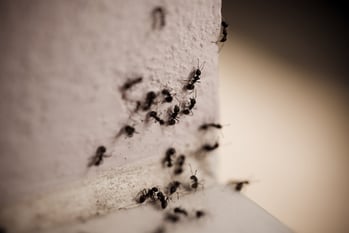Ah, springtime in New England; the magical time of year when the flowers begin to bloom, the air is warm, the sun is out (usually), and seemingly every pest you can imagine is trying to ruin it for you. Ants in particular are becoming quite active lately, and unfortunately, once the ants are marching, it’s not difficult for them to march straight into your home. Here’s what you should know about common household ants in Massachusetts.
 What kind of ants are they?
What kind of ants are they?
Of the approximately 14,000 ant species worldwide, there are only a few native to our region; these include the carpenter ant, pavement ant, and odorous house ant. While there are differences between these three types of ant, they have one thing in common: large colonies that can easily contain thousands of ants.
Are they dangerous?
The ants we are accustomed to in Massachusetts are considered to be “nuisance pests”, meaning they are mostly harmless and little more than an annoyance. If there is a threat to be considered, it comes from carpenter ants. These large ants tunnel into wood to build nests, which can result in costly repairs or structural damage.
Why are they in my house?
Ants are constantly on the move in search of food and water. Without these things, the colony will not survive. Leaky plumbing and standing water (think: sinks, dishes, tubs, even houseplants) or food debris such as spills, crumbs, open trash cans, and pet food are all attractants (get it? Attractant?) for most any type of ant. Because of their small stature, ants need very little space to gain access to your home if something they want is inside; cracks and crevices in foundation or around utility lines, loose or broken screens, and gaps around doors and windows are a few ways ants invite themselves in.
Can’t I just use over-the-counter products to get rid of ants?
While there are a few DIY ant control methods you can employ with some success, over-the-counter products are not the best option. Why? For starters, all ants are not created equal, so techniques that work for one kind of ant may not work for another. Identification is key. Additionally, the ants you see may only be a tiny indication of a much larger problem – it’s likely that a colony is located somewhere less obvious, and these are simply foraging ants. Killing the ants you can see does not eliminate the colony and may only drive the remaining ants to relocate.
Although they are largely harmless, ants are one of the most frustrating pests to control. It can sometimes feel like no matter what you do, the irritating insects just keep coming. That’s where the professionals come in to save your sanity – the ant experts at Burgess Pest are armed with the latest technology and nearly a century of ant control know-how (and it helps that they’re just as persistent as the ants).


